Society
At McLeod Russel, we believe in giving back to the communities where we operate and create opportunities for sustainable livelihoods.
From vocational training, to empowering communities, by providing opportunities to use their local and indigenous skills to generate additional income, our initiatives in the area of sustainable livelihoods are aligned with our operating principles.
We aim to provide and develop opportunities for sustainable livelihoods, by working closely with local communities in rural areas to harness resources and skills that are available. Some of our initiatives in this direction include -
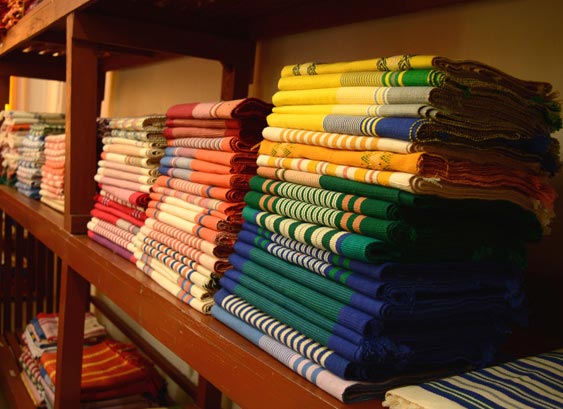 Supporting of the Bodo community through Bodo Handloom Scheme (BHS) The Bodo community is one of the earliest tribes to settle in Assam and their complex art of weaving is an integral part of the Bodo culture. To encourage and empower the women of the Bodo community, McLeod Russel started a unique scheme called the Bodo Handloom Scheme (BHS) in 1995 at Borengajuli Tea Estate in Assam. This highly successful community-based scheme has not only empowered numerous women to continue their cultural heritage but increased their income also.
Presently, we have 140 community members registered with the Bodo Handloom Scheme, and their fabric and products are marketed to numerous towns in the region. BHS has enabled the Bodo women to generate extra income whilst working from home and has improved the standard of living for hundreds of families. The scheme also opened new avenues of employment for these women.
As a part of the scheme, McLeod Russel procures yarn locally at wholesale rates which is then dyed near Borengajuli before being distributed amongst the weavers. An office and a store for yarn and finished goods have been provided to the Scheme by the McLeod tea estate and it is here that the weavers gather twice a week. In addition to providing yarn free of cost to weavers, McLeod also offers guidance in design, colour combinations, sizes and finish of the products to ensure quality consistency.
Supporting of the Bodo community through Bodo Handloom Scheme (BHS) The Bodo community is one of the earliest tribes to settle in Assam and their complex art of weaving is an integral part of the Bodo culture. To encourage and empower the women of the Bodo community, McLeod Russel started a unique scheme called the Bodo Handloom Scheme (BHS) in 1995 at Borengajuli Tea Estate in Assam. This highly successful community-based scheme has not only empowered numerous women to continue their cultural heritage but increased their income also.
Presently, we have 140 community members registered with the Bodo Handloom Scheme, and their fabric and products are marketed to numerous towns in the region. BHS has enabled the Bodo women to generate extra income whilst working from home and has improved the standard of living for hundreds of families. The scheme also opened new avenues of employment for these women.
As a part of the scheme, McLeod Russel procures yarn locally at wholesale rates which is then dyed near Borengajuli before being distributed amongst the weavers. An office and a store for yarn and finished goods have been provided to the Scheme by the McLeod tea estate and it is here that the weavers gather twice a week. In addition to providing yarn free of cost to weavers, McLeod also offers guidance in design, colour combinations, sizes and finish of the products to ensure quality consistency.
 Women's Safety Accelerator Fund (WASAF)
WASAF is a new programme that aims to create safe and empowered conditions for women tea workers in Assam. Along with tea producers, workers, buyers, government departments, service providers and civil society organisations, the WSAF objective is to achieve women's safety within the tea supply chain.
Conceptualized by IDH - the Sustainable Trade Initiative and buyers like Unilever and Tesco, WSAF will enable tea producers to Implement the Global Women's Safety Framework (GWSF) in Rural Places by UN Women. It will reach out to at least 200,000 women workers across 300 tea estates of Assam by 2023.
In the first phase of the project (2021), 32 tea estates from 12 tea companies, across 9 districts will be implementing the activities with support from WSAF empanelled local implementing partners. This includes 5 estates of McLeod Russel India (MRIL) - Behali, Boroi, Dufflaghur, Halem and Nya Gogra. The MRIL estates were also part of the study conducted by WSAF which helped in understanding the prevailing ground realities and challenges faced by management and workers in addressing gender-based violence. The MRIL tea estates' management teams have taken part in the planning for implementation on the WSAF in their estates.
Women's Safety Accelerator Fund (WASAF)
WASAF is a new programme that aims to create safe and empowered conditions for women tea workers in Assam. Along with tea producers, workers, buyers, government departments, service providers and civil society organisations, the WSAF objective is to achieve women's safety within the tea supply chain.
Conceptualized by IDH - the Sustainable Trade Initiative and buyers like Unilever and Tesco, WSAF will enable tea producers to Implement the Global Women's Safety Framework (GWSF) in Rural Places by UN Women. It will reach out to at least 200,000 women workers across 300 tea estates of Assam by 2023.
In the first phase of the project (2021), 32 tea estates from 12 tea companies, across 9 districts will be implementing the activities with support from WSAF empanelled local implementing partners. This includes 5 estates of McLeod Russel India (MRIL) - Behali, Boroi, Dufflaghur, Halem and Nya Gogra. The MRIL estates were also part of the study conducted by WSAF which helped in understanding the prevailing ground realities and challenges faced by management and workers in addressing gender-based violence. The MRIL tea estates' management teams have taken part in the planning for implementation on the WSAF in their estates.
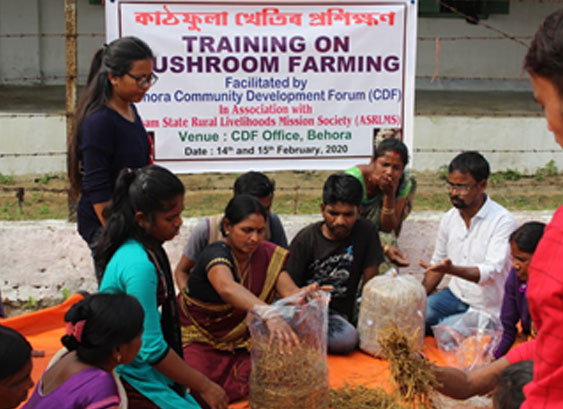 Community Development Fora (CDF)
Formed in 2018, Behora and Bukhial CDF are a registered body under the Societies Act of India. It is a platform, that recognises all stakeholders of the tea estate and provides a valuable intervention, which not only identifies key issues prevalent, but also takes ownership to provide solutions for the same.
Bringing together important members of the community, it has implemented important activities like "Swatch Bagan", Alcohol abuse, children and youth development through learning centres and sports as well, making members of the estate valued citizens through its Panchayati Raj capacity building initiative. Through capacity building, estate development plans are made by the CDF for the community using a participatory approach. These plans are organic and the ownership of implementing them rests with the community.
A testimony to the success of the CDF can be measured by its collaboration with nationally recognised premier organisations like Pratham, UPAI (Frisbee), RVC.
In a structured and methodical manner with formal training, policies and protocols, the CDF has the capacity to sustain a community initiative impacting the socio-economic progress of people of the tea estate.
Community Development Fora (CDF)
Formed in 2018, Behora and Bukhial CDF are a registered body under the Societies Act of India. It is a platform, that recognises all stakeholders of the tea estate and provides a valuable intervention, which not only identifies key issues prevalent, but also takes ownership to provide solutions for the same.
Bringing together important members of the community, it has implemented important activities like "Swatch Bagan", Alcohol abuse, children and youth development through learning centres and sports as well, making members of the estate valued citizens through its Panchayati Raj capacity building initiative. Through capacity building, estate development plans are made by the CDF for the community using a participatory approach. These plans are organic and the ownership of implementing them rests with the community.
A testimony to the success of the CDF can be measured by its collaboration with nationally recognised premier organisations like Pratham, UPAI (Frisbee), RVC.
In a structured and methodical manner with formal training, policies and protocols, the CDF has the capacity to sustain a community initiative impacting the socio-economic progress of people of the tea estate.
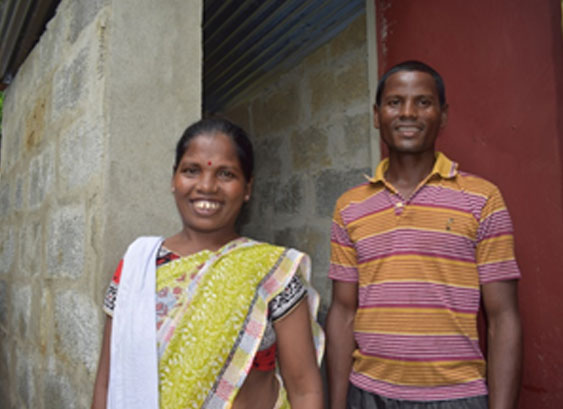 Twinings Sanitation Project
Improving access to water and sanitation in communities on tea estates in North India (Assam and Darjeeling) has been a priority for Twinings over the past 10 years. Access to safe water and sanitation in the household and workplace is a basic human right. Yet, this is still work in progress in many tea estates in India.
Twinings has been supporting Mercy Corps to implement a WaSH project in Dirial tea estate of McLeod Russel India (MRIL) which helped building 188 toilets enabling 1,060 individuals to access safe sanitation facilities. The programme was to compliment the efforts of producers in meeting the water and sanitation needs of the communities living on the estate. These units were supported through Twinings' Sourced with Care programme along with fundraising by Twinings' employees globally. The households and communities in Dirial were reached by awareness on safe hygiene and sanitation practices, hand washing at critical times, safe handling of drinking water and the adoption of good personal hygiene practices. When the COVID-19 pandemic broke out, Mercy Corps leveraged its WaSH campaign and merged it with the COVID-19 awareness campaign through raising communities' awareness on safety measures against COVID-19 such as wearing face masks, regular washing of hands and practising physical distance at public places.
Twinings Sanitation Project
Improving access to water and sanitation in communities on tea estates in North India (Assam and Darjeeling) has been a priority for Twinings over the past 10 years. Access to safe water and sanitation in the household and workplace is a basic human right. Yet, this is still work in progress in many tea estates in India.
Twinings has been supporting Mercy Corps to implement a WaSH project in Dirial tea estate of McLeod Russel India (MRIL) which helped building 188 toilets enabling 1,060 individuals to access safe sanitation facilities. The programme was to compliment the efforts of producers in meeting the water and sanitation needs of the communities living on the estate. These units were supported through Twinings' Sourced with Care programme along with fundraising by Twinings' employees globally. The households and communities in Dirial were reached by awareness on safe hygiene and sanitation practices, hand washing at critical times, safe handling of drinking water and the adoption of good personal hygiene practices. When the COVID-19 pandemic broke out, Mercy Corps leveraged its WaSH campaign and merged it with the COVID-19 awareness campaign through raising communities' awareness on safety measures against COVID-19 such as wearing face masks, regular washing of hands and practising physical distance at public places.
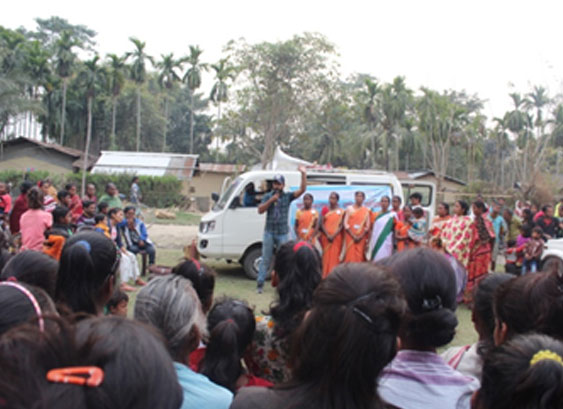 UN Women Programme on Gender Equality.
McLeod Russel India (MRIL) collaborated with the innovative Flagship Programme Initiative, 'Prevention and Access to Essential Services to end Violence against Women and Girls' (VAWG) and 'Safe Cities and Safe Public Spaces', developed by UN Women, the United Nations Entity for Gender Equality and the Empowerment of Women and funded by UNILEVER in 2017. The catalytic programme was launched to address the prevention of VAWG in 6 tea estates in the Udalguri district of Assam.
The programme directly reached out to close to 20,000 rightsholders inside our estates and to more than 500,000 people indirectly through social media outreach and awareness campaigns. Overall, the programme aimed to ensure that women and girls are socially, economically, and politically empowered and live their lives free from intimate partner violence (IPV) and other forms of gender-based violence.
The programme was guided by UN Women's flagship toolkit of Global Women Safety Framework (GWSF). It focuses on locally owned solutions, capacity building and implementation of laws and policies to prevent and respond to sexual harassment and other forms of VAWG at work, public, private and online spaces, and addresses in bringing about a change in the social norms, attitudes and behaviour that promote women and girls' rights in rural spaces.
Through the programme we connected and collaborated with a range of stakeholders including Tea Board of India, Tea Association of India, UPASI, Trust Tea, other tea producers, Assam State Legal Aid Services (ASLSA) and District Legal Services Authority (DLSA), and collaborated with other UN agencies working on the issue of gender equality and women's safety namely UNESCO, UNICEF, and UNDP. Additionally, an outstanding feat of quadripartite partnership between MRIL, ASLSA, UN Women, and UNILEVER was instrumental in establishing the first-of-its-kind Legal Aid Clinic in the history of Assam's around 800 tea gardens with the aim to provide essential legal and care services for women survivors of violence. The Legal Aid Clinic at Paneery was virtually inaugurated in the august presence of all stakeholders.
In the MRIL tea estates now we have JUGNU CLUB'S, an empowered group of women members comprising of the local women workers of our estates. They are actively engaged in awareness campaigns using tools such as street theatre shows and Jhumur songs based cultural shows which were developed by the members and enacted in the local dialect of the region for wider reach and dissemination. Targeted awareness generation activities were conducted with adolescents and youth, Teachers, Health Staff, Parents and students were aimed to sensitize them on the issue of Violence against Women and Girls through workshops and interactive sessions and handouts to foster gender-inclusive environment in the primary schools and other spaces. For generating awareness on VAWG and build respectful adolescent relationship, programme also supported in the development of six films (Lakeer, Kaam ki Baat, Nazariya, Bisitro Manab, Jugnu-the Torch bearer, and Asli Macho).
https://youtu.be/zFoA27oercE
UN Women Programme on Gender Equality.
McLeod Russel India (MRIL) collaborated with the innovative Flagship Programme Initiative, 'Prevention and Access to Essential Services to end Violence against Women and Girls' (VAWG) and 'Safe Cities and Safe Public Spaces', developed by UN Women, the United Nations Entity for Gender Equality and the Empowerment of Women and funded by UNILEVER in 2017. The catalytic programme was launched to address the prevention of VAWG in 6 tea estates in the Udalguri district of Assam.
The programme directly reached out to close to 20,000 rightsholders inside our estates and to more than 500,000 people indirectly through social media outreach and awareness campaigns. Overall, the programme aimed to ensure that women and girls are socially, economically, and politically empowered and live their lives free from intimate partner violence (IPV) and other forms of gender-based violence.
The programme was guided by UN Women's flagship toolkit of Global Women Safety Framework (GWSF). It focuses on locally owned solutions, capacity building and implementation of laws and policies to prevent and respond to sexual harassment and other forms of VAWG at work, public, private and online spaces, and addresses in bringing about a change in the social norms, attitudes and behaviour that promote women and girls' rights in rural spaces.
Through the programme we connected and collaborated with a range of stakeholders including Tea Board of India, Tea Association of India, UPASI, Trust Tea, other tea producers, Assam State Legal Aid Services (ASLSA) and District Legal Services Authority (DLSA), and collaborated with other UN agencies working on the issue of gender equality and women's safety namely UNESCO, UNICEF, and UNDP. Additionally, an outstanding feat of quadripartite partnership between MRIL, ASLSA, UN Women, and UNILEVER was instrumental in establishing the first-of-its-kind Legal Aid Clinic in the history of Assam's around 800 tea gardens with the aim to provide essential legal and care services for women survivors of violence. The Legal Aid Clinic at Paneery was virtually inaugurated in the august presence of all stakeholders.
In the MRIL tea estates now we have JUGNU CLUB'S, an empowered group of women members comprising of the local women workers of our estates. They are actively engaged in awareness campaigns using tools such as street theatre shows and Jhumur songs based cultural shows which were developed by the members and enacted in the local dialect of the region for wider reach and dissemination. Targeted awareness generation activities were conducted with adolescents and youth, Teachers, Health Staff, Parents and students were aimed to sensitize them on the issue of Violence against Women and Girls through workshops and interactive sessions and handouts to foster gender-inclusive environment in the primary schools and other spaces. For generating awareness on VAWG and build respectful adolescent relationship, programme also supported in the development of six films (Lakeer, Kaam ki Baat, Nazariya, Bisitro Manab, Jugnu-the Torch bearer, and Asli Macho).
https://youtu.be/zFoA27oercEhttps://youtu.be/nNwrPjV3P38
https://youtu.be/MjRcjAkb8_4
https://youtu.be/7QiyR2z2sJE
https://youtu.be/CD1Gkq5F8xI
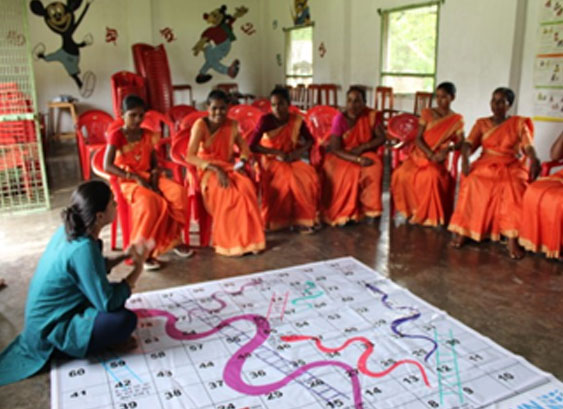 Under the programme a comprehensive review and assessment of the existing policies were undertaken by the implementing partners of UN Women in our gardens and schools to understand the gender aspects and we are committed to make the necessary improvements in the infrastructure and curriculum, wherever possible. Our teams across all ranks were provided with intensive capacity building trainings on the Sexual Harassment of Women at the Workplace (Prevention, Prohibition and Redressal) Act, 2013.
During the COVID-19 pandemic, a series of digital activities were launched including Media campaign on TV and Community Radio to increase awareness on VAWG. MR participated actively in the virtual tea platform meetings, and various interactive workshops/consultations/trainings with key programme stakeholders. The unique platform, supported by Tea Board of India (a statutory body of the Central Government under the Ministry of Commerce and Industry) was curated for voicing issue of violence against women and girls, and to secure their rights and empowerment.
Under the programme a comprehensive review and assessment of the existing policies were undertaken by the implementing partners of UN Women in our gardens and schools to understand the gender aspects and we are committed to make the necessary improvements in the infrastructure and curriculum, wherever possible. Our teams across all ranks were provided with intensive capacity building trainings on the Sexual Harassment of Women at the Workplace (Prevention, Prohibition and Redressal) Act, 2013.
During the COVID-19 pandemic, a series of digital activities were launched including Media campaign on TV and Community Radio to increase awareness on VAWG. MR participated actively in the virtual tea platform meetings, and various interactive workshops/consultations/trainings with key programme stakeholders. The unique platform, supported by Tea Board of India (a statutory body of the Central Government under the Ministry of Commerce and Industry) was curated for voicing issue of violence against women and girls, and to secure their rights and empowerment.
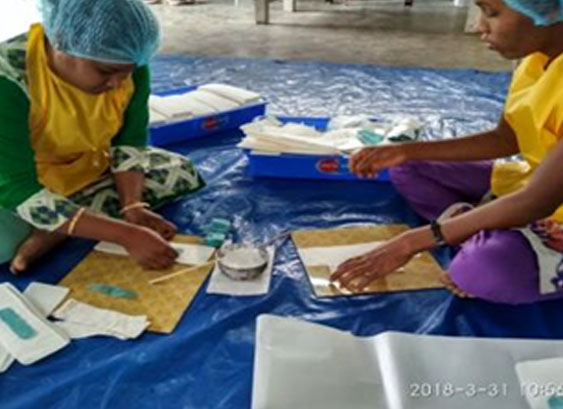 Sanitary Napkin Making Program
The Indian Tea Association in collaboration with Zorg van de Zaak Foundation Netherlands and ABITA in a pioneering effort launched the sanitary Napkin Making program in Keyhung Tea Estate under ABITA Zone 1.
AMAFHH , a Mumbai based certified company was contacted by ITA (sustainability cell) after studying all options, including pricing and supply issues, to deliver the machines and materials. Accordingly the machines and materials (approx. for 60,000 napkins) was delivered to Dibrugarh. The ABITA zone 1 office after collection of the Machinery and Materials sent the same to the respective four estates.
A Trainer, was sent from Mumbai by AMAFHH who began Training of the estate personnel from October30th 2017 onwards to 11th November 2017 separately for individual estates. The Training session was a huge success as girls, including some physically challenged persons, picked up the art of manufacturing the napkins and sterilizing the same for consumption. Trial runs have produced more than 2,000 napkins during the training period.
The cost of Manufacture of the Napkins is approximately Rs 1.50 while the cost of purchase by the community would be Rs 2.50. The revenue earned during the month on an estimated production of 40,000 napkins in 20 working days would be would be used to indent further materials from Mumbai and pay honorarium to the girls who are engaged.
Sanitary Napkin Making Program
The Indian Tea Association in collaboration with Zorg van de Zaak Foundation Netherlands and ABITA in a pioneering effort launched the sanitary Napkin Making program in Keyhung Tea Estate under ABITA Zone 1.
AMAFHH , a Mumbai based certified company was contacted by ITA (sustainability cell) after studying all options, including pricing and supply issues, to deliver the machines and materials. Accordingly the machines and materials (approx. for 60,000 napkins) was delivered to Dibrugarh. The ABITA zone 1 office after collection of the Machinery and Materials sent the same to the respective four estates.
A Trainer, was sent from Mumbai by AMAFHH who began Training of the estate personnel from October30th 2017 onwards to 11th November 2017 separately for individual estates. The Training session was a huge success as girls, including some physically challenged persons, picked up the art of manufacturing the napkins and sterilizing the same for consumption. Trial runs have produced more than 2,000 napkins during the training period.
The cost of Manufacture of the Napkins is approximately Rs 1.50 while the cost of purchase by the community would be Rs 2.50. The revenue earned during the month on an estimated production of 40,000 napkins in 20 working days would be would be used to indent further materials from Mumbai and pay honorarium to the girls who are engaged.
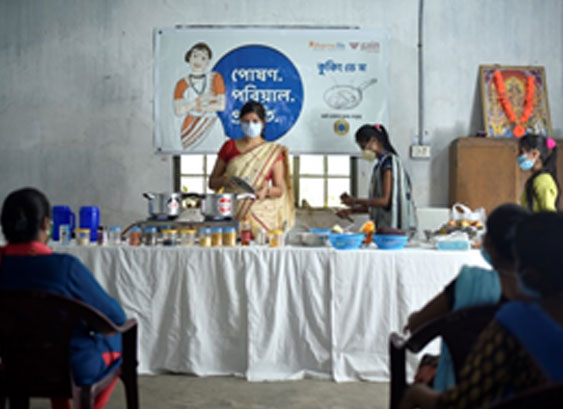 Workforce Nutrition Programme
Tea workers, and their family members mostly consume monotonous diet lacking in essential nutrients. To improve the diets of its worker population, McLeod Russel (MRIL) is implementing the 'Workforce Nutrition' programme in 8 of its tea estates in Dibrugarh-Tinsukia region- (Keyhung, Itakhooli, Dirial, Bogapani, Dehing, Margherita Namdang and Dirok). Implemented by the Dharma life foundation on the ground; the programme is a joint initiative between the Global Alliance for Improved Nutrition (GAIN); a Swiss based international NGO, and the Ethical Tea Partnership (ETP). It focuses on improving the access to and demand for healthier diets as well as hand washing practices and is co-funded by leading tea brands such as Unilever, Taylors of Harrogate, Republic of Tea and a few other global tea companies.
As part of the programme, community awareness and engagement activities such as street plays, cooking competition, cooking demonstration and one-on-one counselliing are being provided to the worker communities to educate and motivate to eat diverse diets. These community events are usually conducted on sunday so that workings of the estate are not disrupted. Besides the community awareness activities, access to nutritions food and hygiene products is enabled through a network of 'Dharmalife Women Entrepreneurs (DLE)' chosen from within the tea estates.
Workforce Nutrition Programme
Tea workers, and their family members mostly consume monotonous diet lacking in essential nutrients. To improve the diets of its worker population, McLeod Russel (MRIL) is implementing the 'Workforce Nutrition' programme in 8 of its tea estates in Dibrugarh-Tinsukia region- (Keyhung, Itakhooli, Dirial, Bogapani, Dehing, Margherita Namdang and Dirok). Implemented by the Dharma life foundation on the ground; the programme is a joint initiative between the Global Alliance for Improved Nutrition (GAIN); a Swiss based international NGO, and the Ethical Tea Partnership (ETP). It focuses on improving the access to and demand for healthier diets as well as hand washing practices and is co-funded by leading tea brands such as Unilever, Taylors of Harrogate, Republic of Tea and a few other global tea companies.
As part of the programme, community awareness and engagement activities such as street plays, cooking competition, cooking demonstration and one-on-one counselliing are being provided to the worker communities to educate and motivate to eat diverse diets. These community events are usually conducted on sunday so that workings of the estate are not disrupted. Besides the community awareness activities, access to nutritions food and hygiene products is enabled through a network of 'Dharmalife Women Entrepreneurs (DLE)' chosen from within the tea estates.
Fast Fact >>
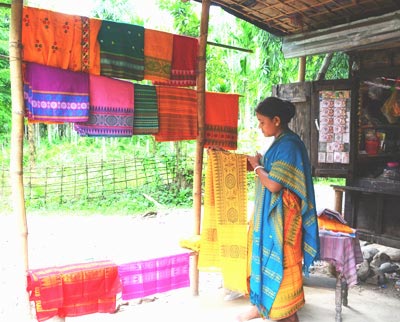

Bodo Handloom Scheme (BHS) meets the hospital linen requirements of almost all the McLeod Russel tea gardens in both Assam and Dooars.

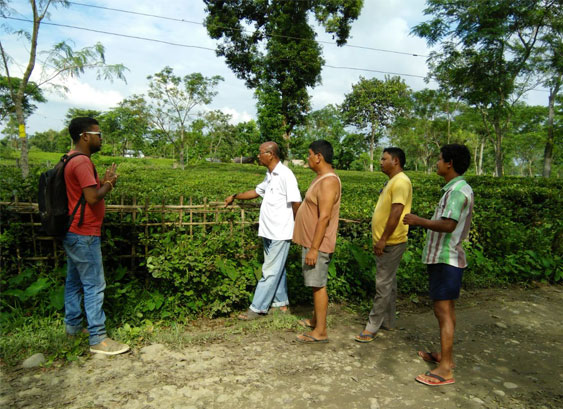 Supporting the small tea growers At McLeod Russel, we also provide infrastructural and management support to small tea growers in Assam. This allows our experience of growing tea to be passed on to the local communities and encourages their sustainability in creating a livelihood and income. We also buy these harvested leaves from small-scale tea planters to provide them the opportunity of ensuring a guaranteed sale for their crop at better than market levels. This opportunity has benefitted the communities throughout the region and on every continent.
Supporting the small tea growers At McLeod Russel, we also provide infrastructural and management support to small tea growers in Assam. This allows our experience of growing tea to be passed on to the local communities and encourages their sustainability in creating a livelihood and income. We also buy these harvested leaves from small-scale tea planters to provide them the opportunity of ensuring a guaranteed sale for their crop at better than market levels. This opportunity has benefitted the communities throughout the region and on every continent.



